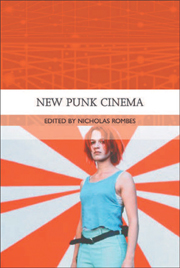Book contents
- Frontmatter
- Contents
- Notes on the Contributors
- Acknowledgements
- Introduction
- PART I BACKGROUNDS AND CONTEXTS
- PART II SCREENING NEW PUNK CINEMA
- PART III CASE STUDIES
- 10 Dogma Brothers: Lars von Trier and Thomas Vinterberg
- 11 Mike Figgis: Time Code and the Screen
- 12 What Was the Neo-Underground and What Wasn't: A First Reconsideration of Harmony Korine
- 13 Repo Man: Reclaiming the Spirit of Punk with Alex Cox
- Bibliography
- Index
12 - What Was the Neo-Underground and What Wasn't: A First Reconsideration of Harmony Korine
from PART III - CASE STUDIES
Published online by Cambridge University Press: 05 August 2013
- Frontmatter
- Contents
- Notes on the Contributors
- Acknowledgements
- Introduction
- PART I BACKGROUNDS AND CONTEXTS
- PART II SCREENING NEW PUNK CINEMA
- PART III CASE STUDIES
- 10 Dogma Brothers: Lars von Trier and Thomas Vinterberg
- 11 Mike Figgis: Time Code and the Screen
- 12 What Was the Neo-Underground and What Wasn't: A First Reconsideration of Harmony Korine
- 13 Repo Man: Reclaiming the Spirit of Punk with Alex Cox
- Bibliography
- Index
Summary
A consolidation of the predominant characteristics of recent Hollywood filmmaking occurred in the success of two late-1990s’ box-office hits: Titanic (1997), the zenith of the film-as-experience strain of ‘High Concept’ North American cinema, and American Beauty (1999), acclaimed for the originality of its approach to its material. The films came across as experiences for the taking, labelled as such for the multiplexes, ‘must-see’ ‘water cooler’ talking points. In this respect, the latter was ‘art as entertainment’, the former, ‘entertainment as entertainment’, a difference of degree between the two but the denominator is common and they both trailed Academy Awards in their wake.
Walter Benjamin once observed a phenomenon that seems, from this close distance at least, especially applicable to the ‘art as entertainment’ sensibility. The application is necessary because American Beauty seems to exemplify, and perhaps anticipates, a contemporary trend in North American filmmaking:
…we are confronted with the fact … that the bourgeois apparatus of production and publication is capable of assimilating, indeed of propagating, an astonishing amount of revolutionary themes without ever seriously putting into question its own continued existence or that of the class which owns it. In any case this remains true so long as it is supplied by hacks, albeit revolutionary hacks … I further maintain that an appreciable part of so-called left-wing literature had no other social function than that of continually extracting new effects or sensations from this situation for the public's entertainment.
(Benjamin 1973: 94–5)- Type
- Chapter
- Information
- New Punk Cinema , pp. 180 - 192Publisher: Edinburgh University PressPrint publication year: 2005



